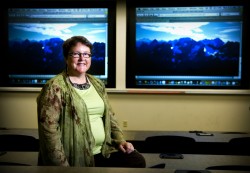Meet Eleanour Snow
October 1, 2010

Even as a child, Eleanour Snow wanted to be a teacher. She got her doctorate in geology from Brown University and went straight into academia, teaching structural geology and mineralogy, and doing research in experimental mineral deformation, at the University of Arizona, and then the University of South Florida (USF). This was her dream job.
One day, the director for geochemistry programs at the National Science Foundation visited the campus. She asked him if he had any advice about research directions for a young scientist in her particular field. He told her, “Find another field.”
Snow took it in stride. It was actually meant as a friendly warning. Federal money for basic science research was drying up. So she decided to go into earth science education, an area that was just beginning to take off. Federal funding for basic research on science education was increasing. There were even new journals dedicated to it.
It meant walking away from a tenure track position and becoming an instructor. It is a position with less prestige at a University. It also meant lower pay. On the positive side, instructors have more flexible schedules and fewer responsibilities. That gave her more time to spend with her young children. Still, she couldn’t shake the question, “If I step down, am I failing?” She had been raised to believe that women could have it all.
“I’ve come to the conclusion that you can have it all,” she said. “You just can’t have it all at once.”
In 1995, she created the first Internet based distance learning course at USF. She developed online courses in oceanography and environmental science, as well as a traditional in-person course for non-science majors called Science, Earth, and Life. Another course she taught focused on how geology has affected the politics, history, and culture of Africa.
Her online courses aren’t just a series of lectures and quizzes, but are designed to be interactive and involve problem solving. Enrollments have been as high as 400, but ironically, she feels that she gets to know the students better in an online class than in a traditional classroom setting. Through emails and live online chats, students tend to be more open about themselves and ask more questions.
Snow and her husband Terry Quinn, now director of the Institute for Geophysics, came to Texas in 2005 on a sabbatical from USF and never left. In that time, she has developed an online forum for TXESS Revolution, a program that trains high school science teachers in minority serving schools. She has also developed an online course for GeoFORCE Texas students giving them dual high school and college credit in earth science. She has also continued teaching her online courses at USF.
Now, 15 years after her big career shift, Snow has just been selected to be the first associate director for outreach at the Jackson School.
“I can’t imagine a better place to be,” she said. “I’m looking at the last quarter of my working life and thinking this is something really important that’s really changing lives and that’s exactly where I want to be. And no matter what path I might have taken to get here, this is where I would want to end up. So it worked ultimately.”
